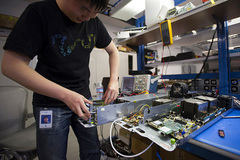Processing Request...
Processing Request...


Aerospace engineers design aircraft, spacecraft, satellites, and missiles. In addition, they test prototypes to make sure that they function according to design.
了解更多

Chemical engineers apply the principles of chemistry, biology, physics, and math to solve problems that involve the production or use of chemicals, fuel, drugs, food, and many other products. They design processes and equipment for large-scale safe and sustainable manufacturing, plan and test methods of manufacturing products and treating byproducts, and supervise production.
了解更多

Civil engineers design, construct, supervise, operate, and maintain large construction projects and systems, including roads, buildings, airports, tunnels, dams, bridges, and systems for water supply and sewage treatment.
了解更多

Computer hardware engineers research, design, develop, and test computer systems and components such as processors, circuit boards, memory devices, networks, and routers. By creating new directions in computer hardware, these engineers create rapid advances in computer technology.
了解更多

Drafters use software to convert the designs of engineers and architects into technical drawings and plans. Workers specialize in architectural, civil, electrical, or mechanical drafting and use technical drawings to help design everything from microchips to skyscrapers.
了解更多

Electrical engineers design, develop, test, and supervise the manufacturing of electrical equipment, such as electric motors, radar and navigation systems, communications systems, and power generation equipment. Electronics engineers design and develop electronic equipment, such as broadcast and communications systems—from portable music players to global positioning systems (GPS).
了解更多

Electricians install and maintain electrical power, communications, lighting, and control systems in homes, businesses, and factories.
了解更多

Environmental engineers use the principles of engineering, soil science, biology, and chemistry to develop solutions to environmental problems. They are involved in efforts to improve recycling, waste disposal, public health, and water and air pollution control.
了解更多

Geological and petroleum technicians provide support to scientists and engineers in exploring and extracting natural resources, such as minerals, oil, and natural gas.
了解更多

Health and safety engineers develop procedures and design systems to prevent people from getting sick or injured and to keep property from being damaged. They combine knowledge of systems engineering and of health and safety to make sure that chemicals, machinery, software, furniture, and other consumer products will not cause harm to people or buildings.
了解更多

Hydrologists study how water moves across and through the Earth’s crust. They can use their expertise to solve problems in the areas of water quality or availability.
了解更多

Industrial designers develop the concepts for manufactured products, such as cars, home appliances, and toys. They combine art, business, and engineering to make products that people use every day. Industrial designers focus on the user experience in creating style and function for a particular gadget or appliance.
了解更多

Materials engineers develop, process, and test materials used to create a range of products, from computer chips and aircraft wings to golf clubs and snow skis. They work with metals, ceramics, plastics, composites, and other substances to create new materials that meet certain mechanical, electrical, and chemical requirements.
了解更多

Mechanical engineering is one of the broadest engineering disciplines. Mechanical engineers design, develop, build, and test mechanical and thermal devices, including tools, engines, and machines.
了解更多

Mining and geological engineers design mines for the safe and efficient removal of minerals such as coal and metals for manufacturing and utilities.
了解更多

Occupational health and safety specialists analyze many types of work environments and work procedures. Specialists inspect workplaces for adherence to regulations on safety, health, and the environment. They also design programs to prevent disease or injury to workers and damage to the environment.
了解更多

Petroleum engineers design and develop methods for extracting oil and gas from deposits below the earth’s surface. Petroleum engineers also find new ways to extract oil and gas from older wells.
了解更多

Sales engineers sell complex scientific and technological products or services to businesses. They must have extensive knowledge of the products’ parts and functions and must understand the scientific processes that make these products work.
了解更多